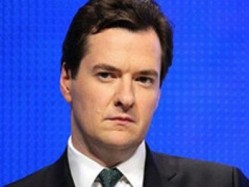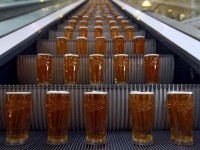Budget 2013: George Osborne scraps Beer Tax Escalator, launches Employment Allowance

In what he called ‘a Budget for hard-workers’, Osborne dropped an upcoming 6p alcohol duty rise and axed the controversial beer Duty Escalator entirely. But it has come at a cost of additional duty on other drinks with higher alcoholic content – wine has gone up by 10p, spirits by 35p and cider by 2p.
"Responsible drinkers in our pubs should not pay the price of problems caused by others," said Osborne - referring to the introduction of the Escalator by the previous Government. "I intend to maintain the planned rise for all alcohol duties with the exception of beer.
'A step further'
"Instead of the 3p rise, I am cancelling the Escalator altogether – that’s the freeze people have been waiting for.

"And I’m going a step further, by taking a further 1p off a pint, which will come into effect on Sunday night."
The Beer Duty Escalator is a policy causing tax on beer to automatically increase by 2 per cent above inflation every year. Since its launch in 2008, beer tax increased by 50 per cent, forcing over 6,000 pubs to close their doors, with 62,000 jobs lost.
Today's scrapping marks the culmination of years of campaigning from pubs, brewers and industry bodies including the British Beer and Pub Association (BBPA) and the Campaign for Real Ale (Camra).
Take a look at our Beer Tax Timeline.
Employment Allowance
While today’s scrapping of the Escalator is good news for pubs, the rest of the hospitality industry also had reasons to raise a glass. Perhaps the biggest boost for business was the creation of an 'Employment Allowance', which will take the first £2,000 of the employer national insurance bill off of every company - this means that around 450,000 small businesses across the UK will pay no jobs tax at all.
“The Employment Allowance shows that understand that the way to restore our economic prosperity is to energise the aspirations of workers,” said Osborne. “If you want to work hard and get on, we are on your side. It’s a budget for an aspiration nation.”
The Employment Allowance will become available in April next year once all of the legislation has passed.
More good news
Osborne’s announcement that corporation tax on company profits would be cut by a further 1 per cent to 20 per cent - the lowest business tax of any major economy in the world - will also be welcomed by hospitality businesses. This is yet another reduction following last year's Budget.
With this announcement, Osborne claimed that ‘Britain is open for business’, pledging that the Government will deliver ‘one of the largest ever packages of tax avoidance and evasion measures presented at a Budget’.
There was also an extension of the holiday from Capital Gain’s Tax for companies keen to raise finance through the Seed Enterprise Investment Scheme – good news for start-ups looking for initial internal investment from their employees.
September's 3p hike in fuel duty has also been cancelled, which could put money back into the pockets of consumers. "Petrol will be 13p a litre cheaper than if he had not frozen the duty over the last two years," Osborne added.
What wasn’t mentioned for hospitality?
Industry bodies such as the British Hospitality Association (BHA) would have welcomed a cut in VAT for the hospitality and tourism industries but, as the previous Hospitality Minister told BigHospitality,the Chancellor would be hard-pressed to cut VAT for the hospitality industry and not others.
There was also no mention of business rates. Under the current proposals, restaurants hotels and pubs continue to pay business rates based on top-of-the-market 2008 rents.The original 2015 revaluation would have seen business rates calculated at 2013 rentable values. But, under the Government’s existing plans, the 2017 change will be calculated at 2015 rentable values, which are likely to be even higher than 2013.
And hoteliers, who are themselves facing high VAT rates and extensive planning delays, had been hoping for a change in the Enterprise Investment Scheme (EIS) to include hotels.But again, nothing was announced.
“An EIS change would be potentially very good news for many businesses and their investors, because it would encourage investment in the industry through new sources of finance,” said the BHAs deputy chief executive Martin Couchman.
Budget 2013: George Osborne's key points at a glance- Price of a pint of beer cut by a penny
- Annual Beer Duty Escalator scrapped, but duty on drinks with higher ABV increased
- Planned 3p hike in fuel duty cancelled
- New 'Employment Allowance' takes off the first £2,000 of the employer National Insurance bill for every company
- Corporation tax reduced to 20 per cent
- UK economy to grow just 0.6 this year - half the rate predicted in the Autumn Statement
Stay tuned to BigHospitality for the hospitality industry's responce to the 2013 Budget, coming shortly. Follow us on Twitterand Facebookfor additional coverage.
Survey
Will the 2013 Budget make things easier for your business?
YES - The Employment Allowance and drop in Corporation Tax will help
32%NO - George Osborne missed a number of more important issues such as business rates and VAT
68%


















